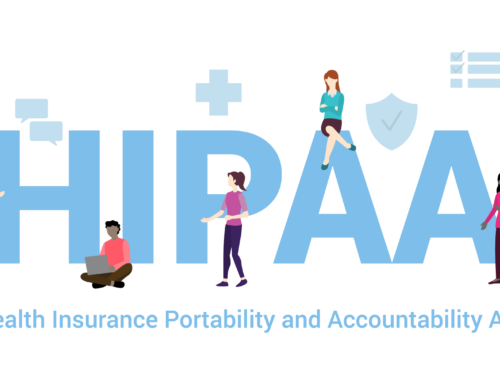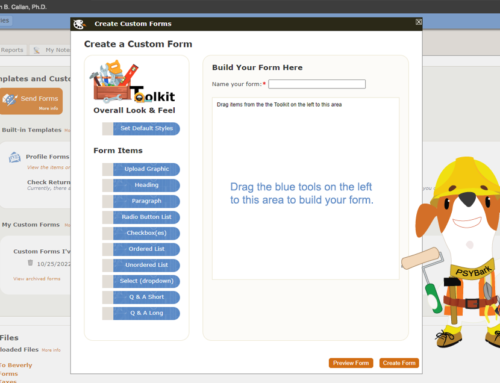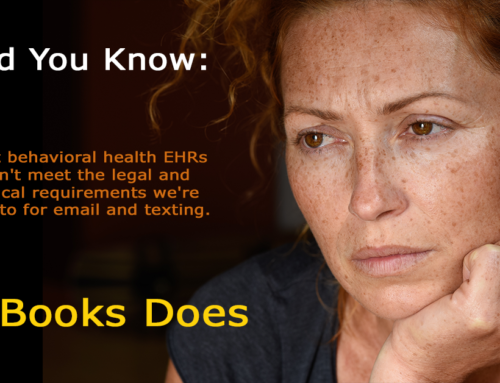Mental health therapists are beginning to talk about wanting “integrated products” to help manage their practice tasks. But what do they mean by “integrated product?” More importantly, if you wanted to look at some, how would you go about finding them? Googling “integrated product” isn’t likely to produce the results you want.
One of the problems is that these types of products go by more than one name. Common names are Electronic Health Record (EHR), Electronic Medical Record (EMR) or Practice Management System. To complicate matters, just being called one of those names doesn’t automatically mean the product is well-integrated. Products that have been built by a process we dubbed earlier as the “three-room house” approach to building EHRs are NOT well integrated.
Instead, when we talk about integrated products, we want a product that offers tools for as many of our routine office tasks as possible, and at a minimum, we would expect it to work like this:
- The product should have ONE login for all tasks and have a single username and password to remember. You shouldn’t have to log in separately for your video, your appointment reminders, your billing tools, or any of the other tools the product offers.
- If you make a change one place in the app, the product should automatically populate that change everywhere. For example, if your patient gets a new email address, you shouldn’t have to change it once in their facesheet, once in their video dashboard, etc. Ideally, you should be able to change the information wherever you’re working in the app and have it repopulate everywhere.
- The product should have a portal attached to it for your patients to use.
- The product should be well supported and show evidence of adding features on a regular basis. You don’t want a product that’s been all but abandoned or that has poor customer service.
What tools/features should this product have? Ideally, every single tool you need. However, that may be unrealistic. The list below shows some tools you may want:
- When your video platform is part of the application you use for all other practice management tasks, many of the other tasks such as collecting payments, filing insurance claims or sending statements or receipts to your patient are automated.
- According to a 2021 study, healthcare providers were responsible for almost 82% of the email breaches that were reported in the past two years to the HHS breach database.1 Furthermore, some email products that claim to be HIPAA compliant don’t fully protect you. PSYBooks email is end-to-end encrypted, no matter what type of device your patients use to retrieve their email.
- You can find stand-alone file storage apps that are HIPAA-compliant but that’s a fee you can eliminate if you have an integrated practice management app. Some integrated products allow you to click a tool when you download a file and automatically add it either to your own files storage area or to a files tab of the patient’s medical record. You can create categories in file storage areas to help you stay organized. Also, like email, file storage can be made virtually unhackable.
- Integrated programs typically offer tools that allow you to request signatures on the documents you send your patients, right from the app. The patient can then sign your forms electronically from their Portal, and send the signed documents back to you.
- Patient portals allow us to communicate securely and professionally with our patients in the same kinds of ways our physical health counterparts communicate with their patients. Some common portal features are: encrypted email, encrypted texting, online payment processing, online scheduling, file sharing and video conferencing.
- You can use non-integrated credit card processing apps and still be compliant with HIPAA as long as you don’t use them to send receipts or statements. As soon as you do that, you need a BAA with that company. Although a few will offer BAAs, many don’t. Also, when the credit card processing is integrated into your EHR, you don’t have to enter the payment info twice, which helps reduce errors. Statements and receipts can all be sent, right from the EHR, in ways that comply with HIPAA.
- The better integrated products will also have a companion mobile app that syncs with your web app. This allows you to take relevant aspects of your practice, such as your calendar and contacts, with you when you’re on the go. Your patients’ contact info is stored online, in the app, not directly on your phone, which makes it less likely that you’d ever have a breach. You can email, text, call and even have video appointments right from your phone, and all within the safety of your encrypted mobile app.
- Integrated products have all of the regular features you would expect a practice management tool to have and much more. Everything works together so it’s easier to be compliant with HIPAA and save both money and time.
You may not need or want all of the features your product offers, but as a general rule, you’re better off with an integrated product even if you start out only using one or two of its features. The other features will be there if you ever need them, and in the meantime, you’ll be able to benefit from the advantages integrated products offer. Some of these are:
- All tools are encrypted & HIPAA-compliant.
- You have one BAA for the whole thing.
- There’s less data entry. You enter something once and all tools update which helps reduce errors.
- They are typically less expensive than getting each tool separately, and this is almost certainly true if you factor in the amount of time they save.
- You only have ONE program to learn and ONE password to remember.
- There’s better risk management since everything is in one place.
We’d love to schedule a demo with you to show you around the PSYBooks EHR & Portal, which we feel is an excellent example of a well-integrated practice management app. If you’d prefer to snoop around on your own, you can also sign up for a free 30-day trial. We hope to hear from you soon!
1Litton, S. (2021). Telehealth for the Mental Health Professions: Constructive and Evidence-Based Tips for Practicing Safely, Efficiently, and Legally. Professional Resource Press.






